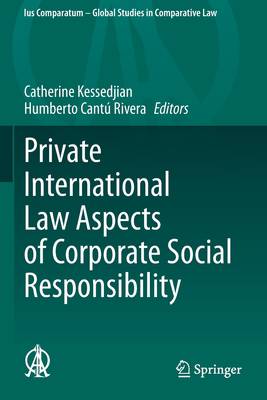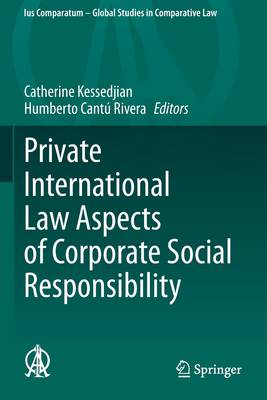
- Afhalen na 1 uur in een winkel met voorraad
- Gratis thuislevering in België
- Ruim aanbod met 7 miljoen producten
- Afhalen na 1 uur in een winkel met voorraad
- Gratis thuislevering in België
- Ruim aanbod met 7 miljoen producten
Private International Law Aspects of Corporate Social Responsibility
Omschrijving
This book addresses one of the core challenges in the corporate social responsibility (or business and human rights) debate: how to ensure adequate access to remedy for victims of corporate abuses that infringe upon their human rights. However, ensuring access to remedy depends on a series of normative and judicial elements that become highly complex when disputes are transnational. In such cases, courts need to consider and apply different laws that relate to company governance, to determine the competent forum, to define which bodies of law to apply, and to ensure the adequate execution of judgments. The book also discusses how alternative methods of dispute settlement can relate to this topic, and the important role that private international law plays in access to remedy for corporate-related human rights abuses.
This collection comprises 20 national reports from jurisdictions in Europe, North America, Latin America and Asia, addressing the private international law aspects of corporate social responsibility. They provide an overview of the legal differences between geographical areas, and offer numerous examples of how states and their courts have resolved disputes involving private international law elements. The book draws two preliminary conclusions: that there is a need for a better understanding of the role that private international law plays in cases involving transnational elements, in order to better design transnational solutions to the issues posed by economic globalisation; and that the treaty negotiations on business and human rights in the United Nations could offer a forum to clarify and unify several of the elements that underpin transnational disputes involving corporate human rights abuses, which could also help to identify and bridge the existing gaps that limit effective access to remedy. Adopting a comparative approach, this book appeals to academics, lawyers, judges and legislators concerned with the issue of access to remedy andreparation for corporate abuses under the prism of private international law.
Specificaties
Betrokkenen
- Uitgeverij:
Inhoud
- Aantal bladzijden:
- 701
- Taal:
- Engels
- Reeks:
- Reeksnummer:
- nr. 42
Eigenschappen
- Productcode (EAN):
- 9783030351892
- Verschijningsdatum:
- 7/03/2021
- Uitvoering:
- Paperback
- Formaat:
- Trade paperback (VS)
- Afmetingen:
- 156 mm x 234 mm
- Gewicht:
- 979 g

Alleen bij Standaard Boekhandel
Beoordelingen
We publiceren alleen reviews die voldoen aan de voorwaarden voor reviews. Bekijk onze voorwaarden voor reviews.











